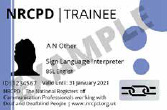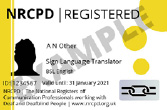On this page
Introduction
To maintain the integrity and highest possible standard of British Sign Language (BSL) and its representation across the industry, there must be an understanding by those wishing to implement it into their creative process. This is a decision that must be undertaken at the very beginning. To ensure that the best possible standards can be reached, the below is some guidance on where to start. It must be noted, however, that this is only a starting point and not a 'one size fits all' approach.
The first thing to consider is that native representation on a panel is fundamental when casting for a BSL role, whether the actor is deaf or hearing. Ensure that you source a deaf person with industry experience to be the 'BSL Monitor' on the panel. They will be able to assess fluency and competency and determine if the level of language acquired is appropriate for the role you are casting. Reliable contacts can be found in the 'Useful Links' section below but in particular, 'Deaf Talent Collective', whom are a consultancy service, can provide advice and resource in regard to this.
It is always important when retaining the integrity of any language that native users are the ones who will represent it better. Therefore, the guidance below is split into two parts: deaf actors and hearing actors with an acquired level of BSL whom should only ever be cast in hearing roles.
This guide was produced by Alim Jayda (actor) and Paula Garfield (Artistic Director, Deafinitely Theatre) in association with Equity.
Casting Deaf actors
It is important to note that not all deaf actors will be on Spotlight as it is not always feasible. Many deaf actors have not had the privilege of accessing formal drama school training as it is not always accessible to them. Most will have gone down different routes of training, therefore may not be on the usual platforms.
To find them, you can use sources such as:
- ProFile
- Theatre Companies such as: Deafinitely Theatre, Graeae & D&H Ensemble (to name a few)
- Deaf Talent Collective
- 'Deaf Actors UK' page on Facebook
- Deaf contacts
- Social media
Get your audition breakdowns translated into BSL if you can. A short video calling out for actors could boost numbers. A deaf person with translation skills can do this and can be found at the above networks. Be aware of the language you use in your breakdowns. 'Deaf' or 'Hard of Hearing' is more than acceptable.
Unacceptable terminology would be:
- Hearing impaired
- Hearing difficulty
- Deaf and Dumb
It is important to remember that deafness is a spectrum and not all deaf actors will use BSL. Communication styles can differ depending on their level of deafness or other factors. Some variants are often described as:
- Uses voice with little or no BSL knowledge.
- Chooses not to use voice with minimal BSL knowledge.
- Uses voice and uses BSL.
- Chooses not to use voice and uses BSL.
If there is a requirement for interpreters when working with the deaf person, the deaf professional may already have a designated list of interpreters they prefer to work with, so it is always worth asking if they have a preference before booking someone. Ultimately though, it is not the deaf person's responsibility to book one unless they specify that they will themselves.
Deaf non-BSL users may prefer a 'Lip Speaker' as rely on lip reading for communication support — information regarding this can be found in the 'Useful Links' section below.
As ever, it is best practice to ask what the deaf person prefers. As evident above, there are various communication strategies and language types adopted by deaf individuals, so consequently it is dangerous to assume.
Casting hearing actors
Try to refrain from calling in actors with no BSL knowledge. British Sign Language is not a language that can be learnt in a short rehearsal period and takes on average 7-10 years to become fluent. It is unreliable to assume everyone has enough dexterity to portray a good standard of BSL and it is frustrating to those who use BSL to see a poor representation of it.
Benchmarks when assessing an actor's profile are:
- Academic qualifications at Level 6 and above
- Is a native user of the language
This way, you are always ensuring that the fluent actor has the capability to adjust their signing level depending on the character they are playing.
Make sure you are aware of the BSL Qualifications/Levels the actors you are calling in have (these are now options on Spotlight when stating BSL as a skill):
- Level 1 — Minimal basics (alphabet, etc.)
- Level 2
- Level 3 — Equivalent to basic conversational French (i.e., GCSE)
- Level 6
- Trainee Sign Language Interpreter
- Qualified Sign Language Interpreter
Important things to remember
Make sure your breakdowns are explicit. Are you looking for an actor who is a strong BSL user? Perhaps you are looking for someone who is deaf and comfortable using their own voice?
Either way, it is important to make this clear in your breakdown and not discriminate should the deaf actor prefer not to use their voice.
ALWAYS book a NRCPD Registered Sign Language Interpreter. A qualified interpreter is always the most reliable preference however some trainees will also have the relevant experience and can be booked if you cannot source the former.
Quality and standards are key for both the panel and deaf person being auditioned so that the right person is cast for the right role.
Working in the creative setting is also a particular skill, so check that the interpreter is experienced in the particular setting but also comfortable before confirming them for the job.
Always ensure they are registered and book at least 2-3 weeks in advance to ensure availability.
Examples of their registration badges:


You can source and check registration on:
- NRCPD
- London BSL Interpreters (London specific)
It is not the deaf actor's responsibility to book an interpreter (see 'Equality Act 2010') so funds for this should be incorporated into the budget. Many established deaf actors may have 'Access To Work' budgets to cover this financial requirement but again, assumptions should not be made and these questions can be asked, as well as whether they have 'preferred interpreters.'
Working with a deaf person and interpreter
Speak to the deaf person directly. There is no need to exaggerate or change your lip and speech pattern. Speaking normally will help maintain ease of communication unless advised by the interpreters themselves.
The interpreter will usually speak in the 1st person so respond to the deaf person as you would when communicating with anyone.
It is always a good idea to communicate with your interpreter and see how they like to work prior to the job. It would be a huge benefit in an audition to allow the interpreter to meet the deaf actor for a few minutes before the audition. This would allow the interpreter and deaf person to understand and get used to each other's sign language style, but this is not compulsory.
Do not ask the interpreter to vet the sign language ability. They are not qualified to do this and are not booked for this purpose. The recommendation would be to book a deaf person to be a 'BSL Monitor' if you want ability to be vetted, as it is the deaf audience that will ultimately be accessing the language. These can be found within various networks already mentioned and 'Deaf Talent Collective', who can signpost you specifically.
Try to avoid getting into conversation and asking the interpreter what various signs are for things. The interpreter is only there to facilitate communication so any questions should go directly to the deaf person when in the room. It is important that the deaf person does not become ostracized and is always a part of the conversation.
It is not best practice to ask the interpreter to voice over for the deaf actor when they are performing the material. The interpreter may not necessarily be au fait with the material and the actor may not be comfortable. This is why having a deaf person part of the audition to vet and give feedback is an advantage.
Aim to send the material to the deaf actors in advance to allow translation time. This is not a skill all BSL users necessarily have so give time prior to the audition to allow them to translate the written English into BSL. A week is a healthy amount of time to get this done to the best standard.
Translation
It is always worth remembering that deaf actors are there, specifically as actors and not as trainers or advisors.
Therefore, it is always best practice to ensure there is another deaf professional onboard to offer advice and guidance throughout the casting and rehearsal period.
Sign Language Translation is a specific skill so always aim to get a deaf person experienced in translating written English into BSL so this responsibility does not fall directly on the deaf person. This person can take the responsibility in translating the English text into British Sign Language and ensure this is done in the most creative way possible whilst working alongside the team and the actor/s themselves.